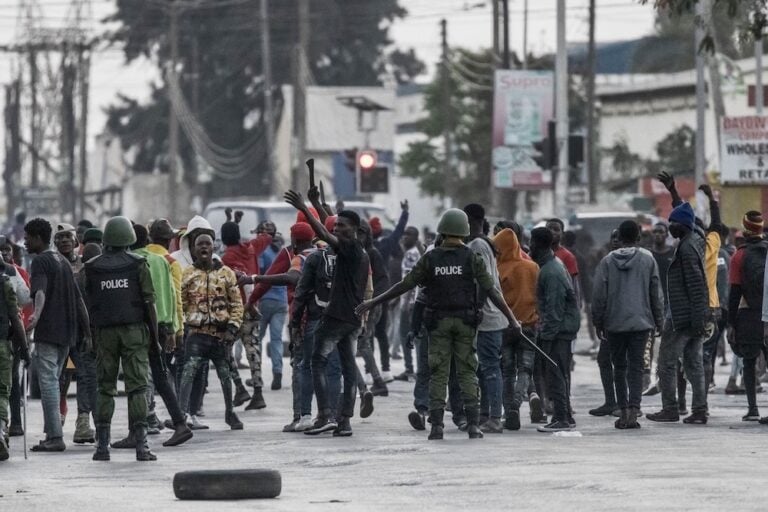(MISA/IFEX) – The Zambian government’s corruption investigation organ, the Zambian Anti Corruption Commission (ACC), has launched a probe into Mike Daka, Director of the autonomous Zambia Institute of Mass Communications Educational Trust (ZAMCOM), reports the Zambia Independent Media Association (ZIMA/MISA-Zambia). No charges against Daka have been specified. On 6 August 1997, Daka was suspended from […]
(MISA/IFEX) – The Zambian government’s corruption investigation
organ, the Zambian Anti Corruption Commission (ACC), has launched
a probe into Mike Daka, Director of the autonomous Zambia
Institute of Mass Communications Educational Trust (ZAMCOM),
reports the Zambia Independent Media Association
(ZIMA/MISA-Zambia). No charges against Daka have been specified.
On 6 August 1997, Daka was suspended from work following
unspecified allegations against him. He was reinstated on 26
August after being cleared of all alleged irregularities in the
running of ZAMCOM (see IFEX alerts of 2 September and 27 August
1997). Daka told ZIMA that the investigation against him only
amounted to “harassment and persecution.” He said he could not do
his work with full concentration. “As far as I knew, I was
cleared of all allegations by the ZAMCOM board in August; who is
now behind this probe?” he asked.
ZAMCOM vice-chairman Manasseh Phiri told ZIMA on 9 October that
his board was not behind the on-going investigation. “The board
has not met since Daka was cleared; I am not aware that the board
has sanctioned the present probe,” he said, adding that “the ACC
could have launched the probe of its own volition or because
someone complained to it.”
Elsewhere, ZIMA reports that opposition member of Parliament (MP)
Ludwig Sondashi has presented a private member’s motion calling
for the privatisation of the state-owned media. Sondashi wants
the two state-owned daily newspapers, the “Times of Zambia” and
the “Zambia Daily Mail”, privatised and the national broadcaster,
the Zambia National Broadcasting Corporation (ZNBC), transformed
into an independent organ. Sondashi believes this would redress
the current state media bias.
Sondashi told Parliament on 15 October that the state-owned media
have failed to cover, in an objective manner, issues related to
human rights violations, democratic governance and rallies held
by opposition parties. He said the continued government ownership
of the “Times of Zambia”, the “Zambia Daily Mail” and ZNBC had
resulted in the ruling party having undue advantage in media
coverage over the opposition and other groups. Sondashi argued
that since these media were funded by taxpayers’ money, it is
necessary that they give non-partisan coverage to all issues. “It
means they are owned by all Zambians, not the ruling clique,” he
said.
Government and ruling party MPs, including former Information and
now Tourism Minister Amuaa Mwanamwambwa, opposed Sondashi, saying
the state-owned media would not be privatised. Ruling Movement
for a Multi-Party Democracy (MMD) chairman Sikota Wina said the
government should continue its financial support of the state
owned-media. Wina said they were a useful tool which the
government could use to defend itself when attacked. “Without the
government-owned newspapers, I don’t think we would be where we
are today,” he said.
ZIMA has expressed solidarity with Sondashi. “We believe that the
serious problems being faced by the government-owned media
include insufficient capitalisation, huge newsprint debts, and
numerous other debts to suppliers, and can only be resolved
through privatisation. These media need a fresh injection of
private capital coupled with a fundamental change in the
operating ethics if they are to be viable,” said ZIMA chairman
David Simpson in a 14 October statement. He called for the
transformation of ZNBC into an independent, public service along
the lines of the South African Broadcasting Corporation (SABC)
and the British Broadcasting Corporation (BBC).


